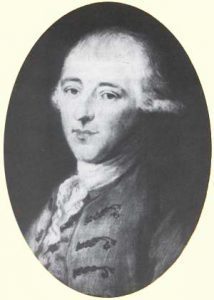S.C. Encyclopedia | Pierce Butler was born on July 11, 1744, in county Carlow, Ireland, the son of Henrietta Percy and Sir Richard Butler, fifth baronet of Cloughgrenan. His parents purchased a commission for Butler in the British army, and he rose through the ranks quickly. In 1766 he attained the rank of major, and in 1768 Butler’s regiment (the Twenty-ninth Foot) was transferred to South Carolina. Butler gained entry into Charleston society through his marriage to Mary Middleton on January 10, 1771. When his regiment returned to England in 1773, Butler sold his commission and remained in Charleston.

Butler
While proud of his aristocratic heritage, Butler nevertheless supported the patriot cause during the Revolutionary War. Governor John Rutledge appointed Butler as the state’s adjutant general in 1779, placing him in charge of organizing, training, and mobilizing the South Carolina militia. Though given the rank of brigadier, Butler preferred his previous title of “major.” After the fall of Charleston in May 1780, Butler joined the army of Horatio Gates in North Carolina and remained with the Continental army until the end of the war. Butler returned to South Carolina to find his family exiled, his plantations burned, and some two hundred of his slaves confiscated by the British. Despite these deprivations, he still favored leniency for the state’s Loyalists and supported the return of their confiscated property.
Although Butler served in the General Assembly from 1776 to 1789, his most significant political accomplishments came at the national level. In 1787 the legislature appointed Butler to both the Confederation Congress and the constitutional convention scheduled to meet later that spring in Philadelphia. In the constitutional debates, Butler generally supported proposals for a strong central government, a single executive, and wealth rather than population as the basis of representation. He also championed South Carolina interests, especially slavery, and vigorously opposed the three-fifths compromise, arguing that slaves represented property wealth and should be counted fully for purposes of representation. “Money is strength,” he argued, “and every state ought to have its weight in the national council in proportion to the quantity it possesses.” Butler also proposed the measure that would eventually be incorporated into the Constitution as the Fugitive Slave clause. Though not entirely satisfied with the final document, he urged its ratification as an improvement over the ineffective Articles of Confederation.
After the convention, Butler returned to the state legislature, where he upheld the interests of the emerging backcountry. His services were rewarded by his election as South Carolina’s first U.S. senator, and he took his seat in New York in June 1789. During his term Butler allied himself with the Federalist Party, supporting the financial program of Alexander Hamilton. Concern for South Carolina interests also was a Butler priority, with one Senate colleague, William Maclay of Pennsylvania, calling him “the most local and partial creature I ever heard open a mouth.”
After his reelection to the Senate in 1792, Butler’s growing sectional interests sparked a reversal in his political allegiances. Breaking with the Federalists, Butler became a vocal Jeffersonian and was mentioned as a possible vice-presidential choice in 1796. Butler resigned from the Senate on October 25, 1796, but returned in 1802 to fill the unexpired term of John Ewing Colhoun. But Butler soon fell out with the Jeffersonians as well. Believing that the Jeffersonians had strayed too far from their principles, he resigned his Senate seat in 1804. Butler had hoped that the nation had changed its political “diet” by electing Thomas Jefferson in 1800, but he declared that Jefferson’s administration was “pork still with only a change of sauce.” So deep was his rift with the administration that he even gave refuge to Jefferson’s disgraced vice president, Aaron Burr, after Burr killed Alexander Hamilton in their famous duel at Weehawken, New Jersey.
Following his departure from the U.S. Senate, Butler concentrated on his numerous landholdings. Beginning in the 1790s, Butler had acquired large tracts of land, especially in Ninety Six District as well as along the coastal region of Georgia. By 1809 Butler was one of the South’s wealthiest planters. His six Georgia plantations produced large crops of rice and cotton through the labor of some 540 slaves. By his death, Butler owned more than 1,000 slaves and his estate was valued at more than $1 million. After his wife’s death in 1790, Butler became largely an absentee landlord, residing most of the year in Philadelphia and coming south only once a year to visit his holdings.
Butler came out of retirement briefly in 1816 to become a director of the Second Bank of the United States. Declining health forced him to refuse a second term. After an extended illness, Butler died on February 15, 1822, and was buried in Philadelphia’s Christ Church Cemetery.
— Excerpted from an entry by Kevin M. Gannon. This entry hasn’t been updated since 2006. To read more about this or 2,000 other entries about South Carolina, check out The South Carolina Encyclopedia, published in 2006 by USC Press. (Information used by permission.)



 We Can Do Better, South Carolina!
We Can Do Better, South Carolina!
























